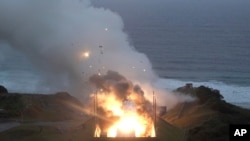ອົງການອະວະກາດຂອງ ຍີ່ປຸ່ນ ໄດ້ຍົກເລີກການທົດລອງເຄື່ອງຈັກສຳລັບຈະຫຼວດ Epsilon S ໃນວັນອັງຄານມື້ນີ້ ຫຼັງຈາກມັນໄດ້ລະເບີດ ແລະ ເກີດໄຟໄໝ້, ເຊິ່ງເປັນຄວາມລົ້ມແຫຼວຊ້ຳຄືນທີ່ມີຄວາມເປັນໄປໄດ້ວ່າຈະດັນການເປີດຕົວປ່ອຍຈະຫຼວດດັ່ງກ່າວກາຍເປົ້າໝາຍທ້າຍເດືອນມີນາ ແລະ ເລື່ອນເວລາໂຄງການອະວະກາດແຫ່ງຊາດອອກໄປ.
ອົງການສຳຫຼວດອະວະກາດ ຍີ່ປຸ່ນ ຫຼື ແຈັກຊາ (JAXA) ໄດ້ກ່າວວ່າການທົດລອງຂະບວນການເຜົາໄໝ້ໄດ້ສົ່ງຜົນໃຫ້ເກີດການລະເບີດຢູ່ເຄື່ອງຈັກຂັ້ນທີສອງ 49 ວິນາທີຫຼັງຈາກໄດ້ເປີດຂຶ້ນ, ຈົນກໍ່ໃຫ້ເກີດໄຟໄໝ້ຢູ່ສູນອະວະກາດ ທານາກາຊິມະ ທາງພາກຕາເວັນຕົກສຽງໃຕ້ຂອງ ຍີ່ປຸ່ນ.
ໃນຂະນະທີ່ບໍ່ມີໃຜໄດ້ຮັບບາດເຈັບ ແລະ ໄຟຖືກມອດພາຍໃນນຶ່ງຊົ່ວໂມງນັ້ນ, ການລະເບີດດັ່ງກ່າວໄດ້ສ້າງຄວາມເສຍຫາຍໃຫ້ສະຖານທີ່ ແລະ ສາເຫດຂອງການລະເບີດແມ່ນຍັງຄົງບໍ່ຈະແຈ້ງ, ຜູ້ບໍລິຫານໂຄງການ Epsilon ຂອງ JAXA ທ່ານ ທາກາຢູກິ ອິໂມໂຕະ ໄດ້ກ່າວໃນກອງປະຊຸມລາຍງານ.
ທ່ານ ອິໂມໂຕະ ກ່າວວ່າ “ພວກເຮົາເສຍໃຈທີ່ພວກເຮົາບໍ່ສາມາດບັນລຸຄວາມຄາດໝາຍຂອງທຸກຄົນ, ແຕ່ມັນກໍມີສັນຍານແຫ່ງຄວາມຫວັງ ທີ່ວ່າພວກເຮົາໄດ້ພົບເຫັນບັນຫາໃນການທົດລອງຢູ່ພື້ນດິນ, ກ່ອນທີ່ຈະໃຫ້ມັນບິນຂຶ້ນ.” ທ່ານກ່າວອີກວ່າມັນມີຄວາມເປັນໄປໄດ້ວ່າຈະໃຊ້ເວລາອີກຫຼາຍເດືອນເພື່ອສືບສວນສາເຫດ ແລະ ເອົາບາດກ້າວຕອບໂຕ້ທີ່ຈຳເປັນ.
ອົງການ JAXA ໄດ້ຮ່ວມມືກັບໜ່ວຍງານອະວະກະຜະລິດເຄື່ອງຈັກໜັກ IHI ເພື່ອພັດທະນາຈະຫຼວດ Epsilon S, ເຊິ່ງແມ່ນຈະຫຼວດລຸ້ນໃໝ່ຂອງຈະຫຼວດ Epsilon ພະລັງເຊື້ອໄຟແຂງຫຼາຍລຸ້ນ.
ຫຸ້ນສ່ວນໃນບໍລິສັດ IHI ໄດ້ຕົກລົງເຖິງ 7 ເປີເຊັນໃນການຊື້ຂາຍຢູ່ ໂຕກຽວ. ໂຄສົກອົງການອະວະກາດ IHI ກ່າວວ່າບໍລິສັດແມ່ນກຳລັງສືບສວນສອບສວນຫາສາເຫດ.
ຖ້ຽວບິນເປີດຕົວຂອງ Epsilon S ແມ່ນມີກຳນົດໃນທ້າຍປີງົບປະມານນີ້ຮອດວັນທີ 31 ມີນາ ຂຶ້ນກັບຄວາມສຳເລັດໃນການທົດລອງເຄື່ອງຈັກຂອງວັນອັງຄານມື້ນີ້.
ການທົດລອງດັ່ງກ່າວໄດ້ດຳເນີນຂຶ້ນຫຼັງຈາກຄວາມລົ້ມແຫຼວກ່ອນໜ້ານີ້ ທີ່ໄດ້ກໍ່ໃຫ້ມີການສືບສວນສອບສວນຫຼາຍເດືອນ ເຊິ່ງໄດ້ເຮັດໃຫ້ພາລະກິດອະວະກາດ ແລະ ແຜນການສົ່ງດາວທຽມຫຼ້າຊ້າອອກໄປ.
ອ່ານຂ່າວນີ້ເປັນພາສາອັງກິດ
Japan's space agency aborted an engine test for the Epsilon S rocket on Tuesday after it exploded and caught fire, a repeated failure that will likely push the rocket's debut launch beyond the March-end target and delay the national space programme.
The Japan Aerospace Exploration Agency (JAXA) said the combustion test resulted in an explosion of the second-stage motor 49 seconds after the ignition, causing fire at the Tanegashima Space Center in southwestern Japan.
While no one was injured and the fire was put out within an hour, the blast damaged the facility, and the cause remains unclear, JAXA's Epsilon project manager Takayuki Imoto told a media briefing.
"We are sorry that we couldn't meet everyone's expectations...but a silver lining was that we found (the issue) at a ground test, before putting it for a flight," Imoto said, adding it will likely take at least several months to investigate the cause and take necessary countermeasures.
JAXA partnered with the aerospace unit of heavy machinery maker IHI to develop Epsilon S, the next generation in the Epsilon solid-fuel small rocket series.
Shares in IHI were down as much as 7% in Tokyo trade. An IHI Aerospace spokesperson said the company was investigating the cause.
Epsilon S's debut flight was slated by the end of the fiscal year through March 31 depending on the success of Tuesday's engine test.
The test was conducted after previous failures triggered months of investigation which have delayed space missions and satellite launch plans.





ຟໍຣັມສະແດງຄວາມຄິດເຫັນ